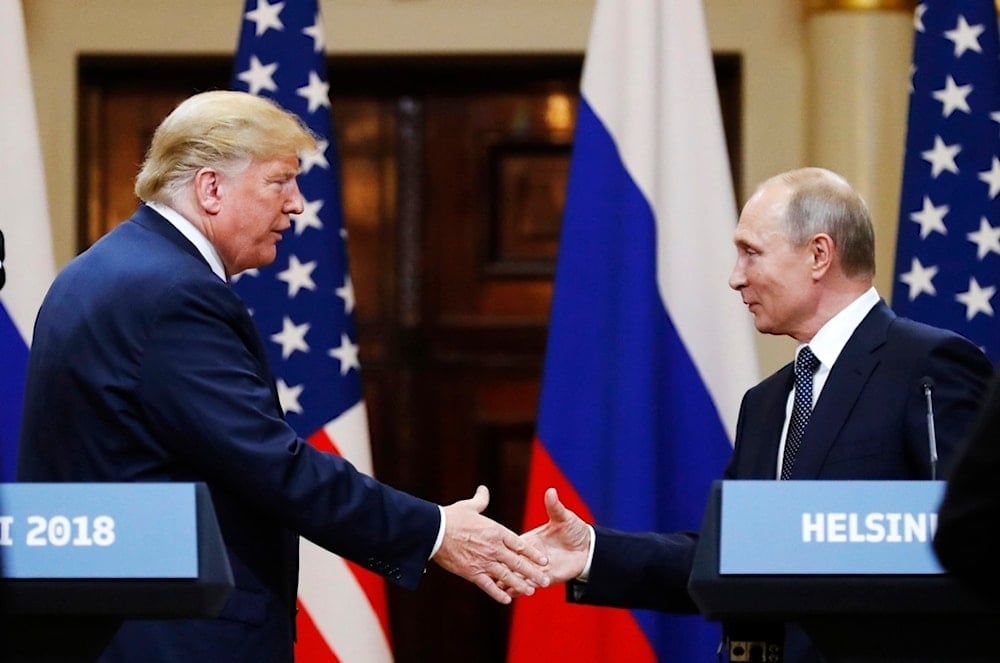Russia asked US to withdraw NATO from eastern Europe: Financial Times
Russia's demand for NATO's withdrawal from Eastern Europe during US negotiations has raised concerns in Europe about potential concessions from the Trump administration.
-

In this file photo taken on Monday, July 16, 2018, US President Donald Trump shakes hand with Russian President Vladimir Putin at the end of the press conference after their meeting at the Presidential Palace in Helsinki, Finland. (AP)
Russia has requested the withdrawal of NATO forces from the alliance’s eastern flank during the first round of negotiations with the United States on ending the war in Ukraine, the Financial Times reported on Thursday.
This demand has raised concerns in European capitals that US President Donald Trump’s administration might agree to a peace deal on Russia’s terms.
According to the newspaper, Romanian presidential chief of staff and national security adviser Christian Diaconescu revealed that the US delegation had "rejected Moscow’s demand." However, he warned that there were "no guarantees that Washington will not ultimately make this concession."
Speaking on television Wednesday, Diaconescu cautioned that "as far as I understand, the situation can change from hour to hour or from day to day," referencing Trump's recent sharp criticism of Ukrainian President Volodymyr Zelensky and what the newspaper described as concessions the US had already made to Russia before the talks even began.
Diaconescu noted that Romanian President Ilie Bolojan met with his French counterpart, Emmanuel Macron, in Paris on Wednesday and came away convinced that European leaders "will stress in their contacts with the US the need to be involved in any security arrangements affecting the region." This follows European nations being left out of the initial US-Russia discussions in Riyadh.
Europe to urge US not to comply
The Romanian official also confirmed that British and French officials would visit Washington next week in an effort to convince President Trump "not to surrender to Russia’s demand" for NATO’s withdrawal from Eastern Europe, calling the current situation "extremely complicated and serious."
A senior European official told the Financial Times that there was still uncertainty over whether European leaders’ concerns were being heard in Washington. "The risk and concern remain that Russia tricks DC into something via a push on Ukraine," the official stated.
Eastern European nations, which lie on NATO’s front line, are increasingly anxious about Trump’s intentions following recent concessions by his administration to Moscow, from ruling out Ukrainian NATO membership to pledging to normalize US-Russia relations.
According to the Financial Times, Trump has alarmed US allies in Europe by suggesting that "Ukraine’s attempt to join NATO was the reason for the war."
Meanwhile, in Poland, the government insists that it has "no reason to fear Trump abandoning them" but is urging European partners to heed Trump’s call to increase defense spending across the continent, the report added.
'Zelensky a dictator'
Trump’s statement comes after he described Wednesday his Ukrainian counterpart as a "modestly successful comedian" and a "dictator without elections," warning that Ukraine risks losing everything unless he moves swiftly toward a peace agreement with Russia.
"He [Zelensky] refuses to have Elections, is very low in Ukrainian Polls, and the only thing he was good at was playing Biden ‘like a fiddle.’ A Dictator without Elections, Zelenskyy better move fast or he is not going to have a Country left," Trump wrote in a post on his Truth Social platform.
He asserted that his administration was successfully negotiating an end to the war with Russia, something he claimed only he and his team could achieve.
Trump concluded, "I love Ukraine, but Zelensky has done a terrible job, his Country is shattered, and MILLIONS have unnecessarily died – And so it continues….."
Trump's remarks came just hours after Zelensky pushed back against his claim that Ukraine was responsible for the ongoing war with Russia, accusing the US President of being caught in a Russian "disinformation" bubble.

 4 Min Read
4 Min Read









